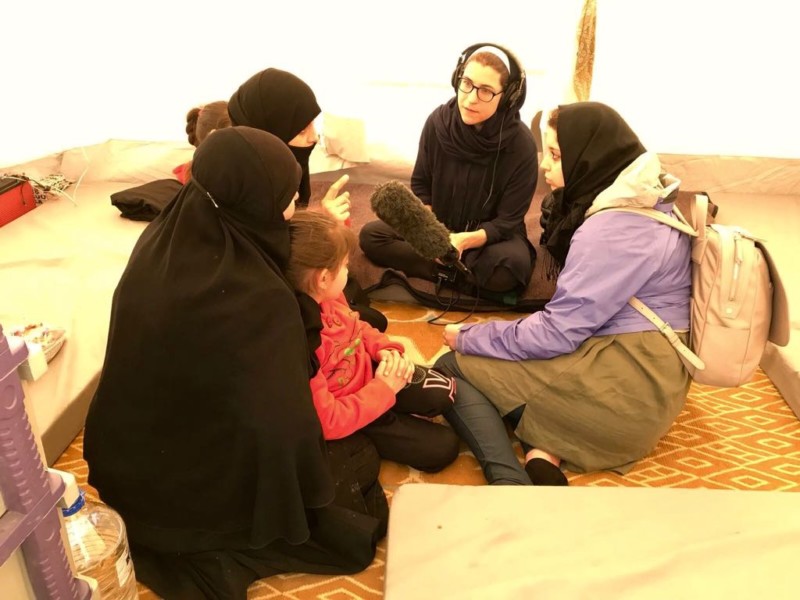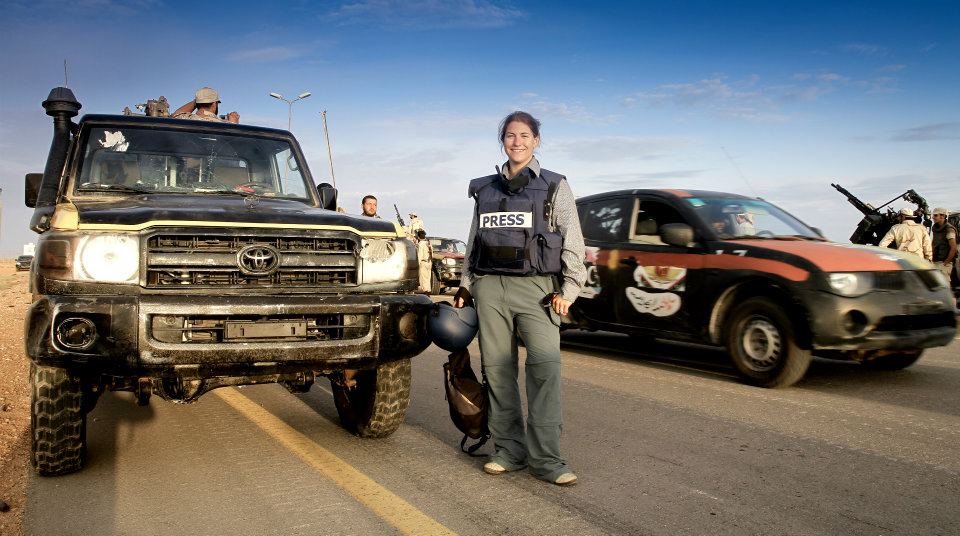Sign up for The Media Today, CJR’s daily newsletter.
In 2015, Shamima Begum left her family home in London to run away to Syria and join the Islamic State. She was 15, and still in school. In the four years that have since passed, as Britain has turned toward nativism, hostility towards female members of ISIS has helped conservatives whip up their base. When Begum, now 19, arrived at the Al-Hol refugee camp in northeastern Syria in February, after surrendering to Syrian Democratic Forces, she quickly became a polarizing figure in Britain—the poster child for former ISIS members trying to return home, or, as the right sees it, sponge off the government while plotting against the West.
A British news crew found Begum soon after she gave birth to her third child. She was still in a delivery room, barely sitting up, when Sky News entered and trained their cameras on her. A day after she gave birth, ITV News handed Begum a letter and told her to open and read it on camera. It was from the British Home Office—the government ministry which oversees immigration, among other things. It had revoked her British citizenship. “You’ve destroyed your family’s lives,” the reporter said. Begum’s newborn son, Jarrah, lay still in her lap, wrapped in rags. He was still a British national.
The British tabloids responded with bilious rage to what was seen as detachment in Begum’s demeanor. “ISIS bride Shamima Begum might NEVER be de-radicalised because she has shown ‘no remorse or regret’” a Daily Mail headline said.
ICYMI: Graphic memoir illustrates new frontiers in ISIS coverage
“It’s unprecedented to have so many people in this situation,” Ruth Sherlock, an international correspondent for NPR, says. Sherlock has been reporting on Begum and other families left behind by the Islamic State in Syria. She estimates there are nine thousand foreigners in the Al-Hol camp alone. (Kurdish officials have estimated that they hold thousands, or even tens of thousands, of foreigners in two camps from about 44 countries including Britain, America, Canada, Russia and central Asia.) “What someone did in ISIS and whether they should be allowed to come back should be two separate questions,” Sherlock says. “The European media blurs that line.”
Yesterday Sherlock launched a four-episode series, “How it Ends,” on NPR’s Embedded podcast, focused on the gray area ISIS refugees like Begum inhabit. Sherlock follows four family members’ search for loved ones who joined ISIS in Syria. In the first episode, listeners meet a Canadian woman, who takes the pseudonym Rima, as she searches for her brother, whom NPR does not name, in Syria. He has a history of mental health issues, we learn. He completed courses on sharia law and military training with the Islamic State, but it is not clear that he ever fought before attempting to leave the group. ISIS imprisoned him, and he is now in a jail run by the Syrian Democratic Forces. When Rima finally finds him, he is so malnourished that he can not walk unaided. The two are allowed a single meeting.

Ruth Sherlock interviews Syrians who just fled the scene of an alleged chemical attack in Douma in 2018. Beside her is her colleague Lama al-Arian. Photo courtesy of Ruth Sherlock.
Canada has not yet stepped in to repatriate Rima’s brother, or any Canadian nationals asking to leave Syria. Sherlock asks Rima what she wants for her brother in spite of people who believe citizens who leave their country to join a terrorist organization should be left in Syria to rot. “To face justice,” says Rima says. To her the right to a fair trial is fundamental to citizenship. “As a country we decided we’re going to respect each human.”
“I don’t know if that’s correct,” says Sherlock on the phone from Beirut, “but it’s a thorny point the media should be covering.”
Sherlock, who has covered the Middle East since 2011, says the western idea of the Islamic State as a “terrorist organization” makes it sound much grander than it actually is. “It’s really a mafia structure,” she says on the phone from Beirut. “[Members of the Islamic State] have been warned never to criticize. But they’ve been part of it for so long, they don’t even know how to answer questions in a way that the West will let them come home.”
Sherlock, who lives in Beirut, reports on many of her stories through the lens of children and families affected by ISIS. “This beat’s so interesting because it does challenge our assumptions,” she says. “We have a gut instinct to suddenly seek revenge on anyone who went to Syria, and we’re very aware that our reporting runs counter to the prevailing narrative of the extremist murderer who wants to attack the West.”
Sherlock tries to avoid what she calls “ISIS jihadi bride” language—shorthand in the media that assumes that women and girls in ISIS work to destroy the West through violent means. Instead, she writes stories that report into the human toll of ISIS’s reign in parts of Syria and northern Iraq: “A Father In Florida Is Frantically Trying To Find His Children In Syria” and “Trinidadian Mom Reunites With Kids Taken By Their Father To ISIS” are more recent fare.
Sherlock was disappointed by the way journalists hounded those who joined ISIS but did not actually fight. “Trying to understand the perspective someone’s coming from isn’t an endorsement,” Sherlock says. “It isn’t an accurate interview without the context. The gray areas are lost. I am interested in how the media should respond. Yes ISIS committed atrocities. Some members are violent. But some caused no harm and never left the house.”
Sherlock has lost colleagues to ISIS: Jim Foley, Steven Sotloff, Peter Kassig. (The image for this story was taken by Sherlock’s friend John Cantlie, who was kidnapped by ISIS in 2012 and is presumed dead or still in captivity.) And she survived a kidnapping attempt in 2014 herself. As she interviewed the family of a young boy who had suffered third-degree burns in a suicide bombing, at a clinic in Yabrud, 50 miles north of Damascus, her fixer overheard plans to abduct her and physically forced her back to the car before smuggling her to Lebanon. “He saved my life,” she says.
She traces the loss of that nuance and context in ISIS coverage—especially coverage about Syria’s civil war—to Trump’s presidential campaign in 2016. “It hit me watching Trump as a candidate, describe ISIS as an “existential threat,” she says. “Most of their terrible acts were against Muslims and minorities in the Middle East. There was no way they could threaten a superpower like the US, but hyperbole entered the public discourse, fueled by ISIS propaganda, beheading videos. This is what they wanted to accomplish.”
For now, Begum remains in the refugee camp in Syria. Since her British passport was revoked, she is now stateless. Her son, Jarrah, died a few weeks later from a lung infection. Begum told The Times of London she regretted those early interviews she gave in February, when she had just arrived at the camp. “I was still brainwashed,” she said.
ICYMI: White-supremacy threat demands its own beat reporters
Has America ever needed a media defender more than now? Help us by joining CJR today.



